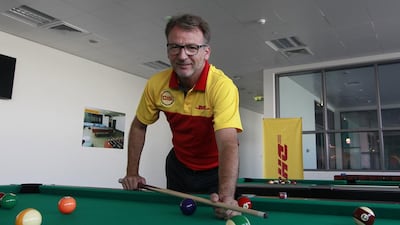Generous holiday entitlement, check. Good health insurance cover, check. Private ambulance service, check.
Yes, you read correctly – an ambulance service.
It is just one of a growing list unusual work perks now offered by companies operating in the Emirates.
"The service is staffed by professionally trained emergency medical technicians and equipped with the latest technology," says a spokesman for Etihad Airways, which operates the 24/7 service for its Abu Dhabi-based staff.
But that is not the only unusual benefit it offers its employees.
The company also operates a medical centre staffed by almost 30 experts; an aviation-themed nursery offering child care at competitive rates; free membership at eight gym facilities and personal training across the capital; a book of 1,000 two-for-one vouchers to restaurants, activities, attractions, spas and hotels; and discounts on goods and services and of course, on flights.
However, Etihad is by no means alone in offering unusual work perks.
Omnicom Media Group Mena built a gym in its Media City office for employees where it holds daily fitness classes after staff said they worked in such a busy industry they hardly had any time for their personal lives. In response, the company also introduced flexi hours and the concept of working from home, says Maha Zaatari, the managing director of Great Place to Work Institute in Dubai, which conducts an annual survey and lists the best places to work in the UAE. Omnicom is the third best place to work in the UAE this year, according to the survey.
DHL Express, the global logistics company and reigning best place to work according to the survey, has some alternative benefits of its own. Employees have been treated to free ice-cream and they can play billiards in the company’s new office in Meydan, Dubai or work out in the gym. Plans are also afoot for a quiet room and free yoga classes.
It all raises the question: why? Are standard work perks not good enough any more?
“No,” says Ms Zaatari. “We are in a very competitive market, especially here in this region. People are unfortunately driven towards a higher salary job. But when you offer these outstanding benefits and perks, employees will be less likely to move for a Dh500 or Dh1,000 increase because they know they won’t be as comfortable or as well taken care of as they are in this organisation.”
Perks enhance and improve the bond between the employee and the organisation, she adds.
The better the benefits, the more engaged an employee will be to come to work each day, knowing that they are being taken care of as an individual as opposed to just being a number. It will also be easier to retain them from the company’s side.
It is a philosophy both companies would agree with.
“Etihad Airways employs more than 20,000 people from over 140 nationalities in a challenging industry. With a large, growing workforce, and a demanding 24/7 operation, we need to attract and retain the best people we possibly can from around the world,” says a spokesman for Etihad.
People also mean everything to DHL, says the company’s country manager, Frank Uwe-Ungerer. It lives by the service-profit chain model – in other words, motivated and engaged people deliver a good service to clients and clients then in turn stay loyal and the company makes a profit.
“We have a call centre of over 100 people and each of them makes 100 to 120 calls a day. This is very, very hard work. Number one they pick up the phone in a maximum of two ringtones and each time either it is a quick booking, or it is a follow up on something or it is something complicated,” says Mr Uwe-Ungerer.
“We need to provide them space to calm down and relax, so they can do many things. We have an outdoor terrace, we have the cafeteria, we have the billiard table and we have a quiet room with couches and it is a bit darker. There will be headphones with music. They can listen to birds or waves and they can just chill out for five minutes or 10 minutes, fully recharge their batteries and go back and serve their client.”
It is all part of DHL’s work hard, play hard culture, he says. But he stresses that a work/life balance is also important.
“We want people to wake up on a Sunday morning and say hey great the week has started let’s go to work,” adds Mr Uwe-Ungerer. “And we want the same on a Thursday evening to say great, the week is over. Now I can spend time with my family.”
business@thenational.ae


